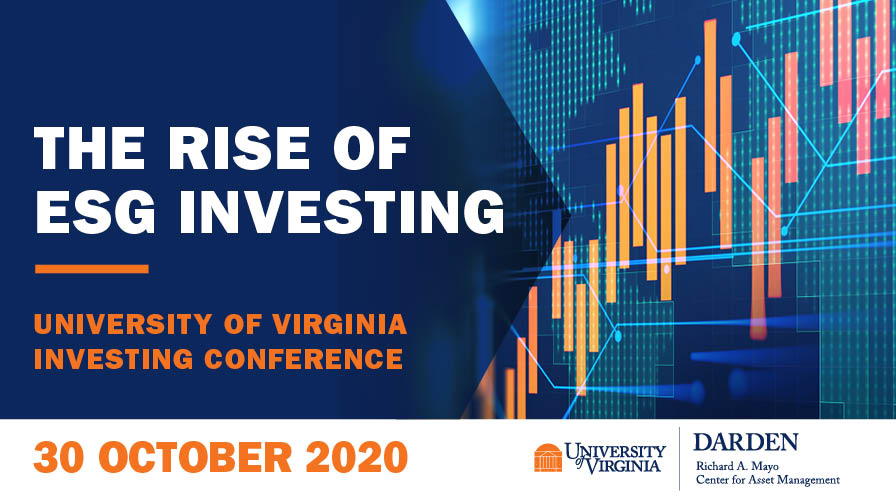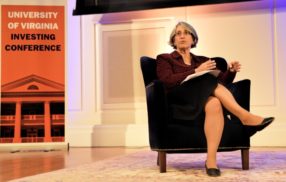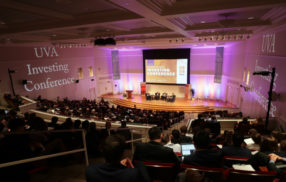
UVIC 2020: ESG Investing Goes Mainstream
By Dave Hendrick
Leading off this year’s virtual edition of the University of Virginia Investing Conference (UVIC), Generation Investment Management Co-founder and Senior Partner David Blood discussed the need to reframe conceptions about environmental, social and governance (ESG) investing.
The one-time Goldman Sachs executive, whose current company holds roughly $30 billion in assets under management, said the firm doesn’t treat ESG as a niche or subset of activity; rather, sustainability analysis guides every investment decision taken by the company, which also counts former Vice President Al Gore as a co-founder.
“We think sustainable investing and ESG is mainstream. It’s not a special idea,” Blood said at the conference, which was hosted virtually by the Richard A. Mayo Center for Asset Management at the Darden School of Business on 30 October.
Generation is a certified B. Corp. with a focus on long-term returns, and sees no disconnect between driving financial gain and making positive change, Blood said.
“We do not believe that our investment framework is trading values for value,” Blood said, saying the firm “fundamentally disagrees with the notion that an ESG focus implies any sort of tradeoff.”
Instead, the firm is composed of “very driven, traditional fund managers” whose philosophy consists of three core tenants:
- Long-term investing is best practice.
- Sustainability factors, trends or challenges are drivers of economies.
- ESG factors are tools to help understand businesses and management teams, including what a company does and how it does it.
The UVIC 2020 theme was “The Rise of ESG,” and came as investments with an ESG focus or component have risen dramatically in recent years. Investing experts predict they will likely continue to rise, driven by a number of factors, ranging from the pull of opportunity as entire sectors are remade with a focus on sustainability to the growing interest of retail investors in the space, among other factors. According to a 2020 Deloitte report, ESG-mandated assets could make up half of all managed assets in the U.S. by 2025, at $34.5 trillion.
Still, the sector is poorly defined, with a variety of different metrics used to measure and certify ESG-related attributes.
For investors pushing the space forward and uncovering opportunity, tapping into ESG investments is not about “checking boxes,” rather an exploration of the space can offer a new framework to vet the companies that will help to fundamentally reshape industries, said Blood.
While economic returns are a key indicator of success, the company is also trying measure impact, which he said would “clearly be a driver of the industry as we go forward” — and a metric clients are increasingly requesting. Blood said he would grade his firm with a “C” on impact reporting thus far, not yet up to the “rigorous standards” that will be necessary in the coming years.
The push for impact comes as the company embarks on what Blood described as the most consequential of his career, with the need to “fundamentally transform our economies” representing what he described as both a “tremendous responsibility and tremendous investing opportunity.”
“The transition to net zero [emissions] will be the most significant economic change in history,” said Blood. “Everything we have done today will change in the next five to 10 years, and that change can be for the best.”
The near future may see the wholesale transformation of enormous swaths of society, notably energy, mobility and agriculture. “Capital allocator” firms such as Generation are “right in the middle” of that transformation, he said.
“This is a big deal and we can’t just think about it as incremental,” said Blood. “This is about building great resilient businesses and creating great jobs.”
Blood said if capital allocators believe ESG-related trends are fundamental drivers of businesses and economies, then that thesis should be deployed across asset classes.
Activist Opportunities for ESG Investors
At the conference’s second panel, two well-known activist investors unpacked how ESG is impacting their space at a session moderated by Darden Professors Pedro Matos and Mary Margaret Frank.
Teresa Barger, co-founder and CEO of Cartica, offered a perspective on ESG in emerging markets, where she suggested the criteria can aid immensely in selecting long-term investments. The activist investment firm engages with publicly traded small and mid-cap companies in emerging countries and applies a proprietary ESG methodology to “manage risk and identify potential value-adding engagement issues.” The firm says its investing approach “starts with the G,” with value creation through better governance key to its management philosophy.
An ESG framework in emerging markets can be particularly potent, Barger said, with governance improvements and sustainable orientations helping to “add value and clarify business models.”
“ESG helps businesses minimize negatives — but can also enhance overall business models,” Barger said.
Jeffrey Ubben, founder and managing partner of Inclusive Capital Partners, described his mindset shift from an investor with a shareholder-primacy orientation in his previous leadership position with ValueAct Capital to his current position with Inclusive Capital, where there is a shift to a stakeholder model.
“My goal is to change strategy,” Ubben said.
Although focused on ESG initiatives going forward, Ubben said the popular conversation around ESG misses much of the point, particularly as it relates to many ESG funds currently available to investors. ESG funds often include as core investments the same handful of companies, but Ubben said many of those companies “are not businesses improving social outcomes.” Moreover, he suggested such funds are of questionable utility for those who hope ESG will drive real change.
“If ESG goes passive before active is figured out, we will lose the opportunities,” Ubben said.
Barger said the varied and often contradictory standards offered by data providers for scoring ESG investments is also to the detriment of investors.
“I think in this ratings game, and in the standard-setting, we have nine innings yet to go,” said Barger.
While there is momentum behind the rise of ESG efforts, particularly in 2020, Barger said it is up to ESG adherents “to prove that the positive momentum is not a fluke of this weird time of 2020.”
Said Barger, “We can prove it works every week, every quarter, every year and it is on us to do that.”
The University of Virginia Darden School of Business prepares responsible global leaders through unparalleled transformational learning experiences. Darden’s graduate degree programs (MBA, MSBA and Ph.D.) and Executive Education & Lifelong Learning programs offered by the Darden School Foundation set the stage for a lifetime of career advancement and impact. Darden’s top-ranked faculty, renowned for teaching excellence, inspires and shapes modern business leadership worldwide through research, thought leadership and business publishing. Darden has Grounds in Charlottesville, Virginia, and the Washington, D.C., area and a global community that includes 18,000 alumni in 90 countries. Darden was established in 1955 at the University of Virginia, a top public university founded by Thomas Jefferson in 1819 in Charlottesville, Virginia.
Press Contact
Molly Mitchell
Senior Associate Director, Editorial and Media Relations
Darden School of Business
University of Virginia
MitchellM@darden.virginia.edu






